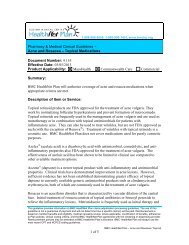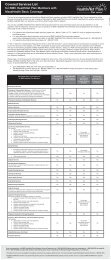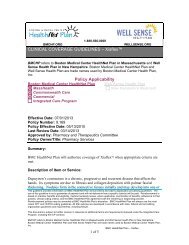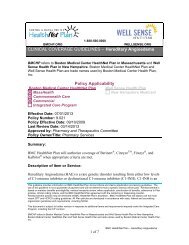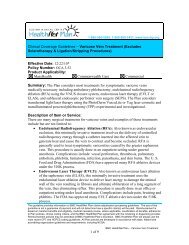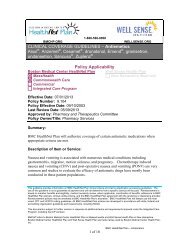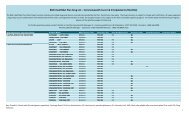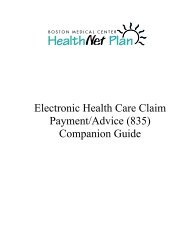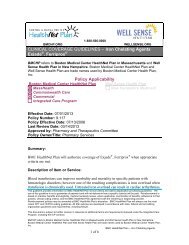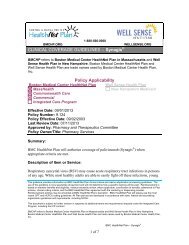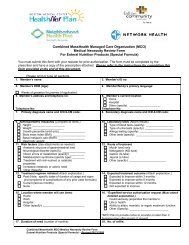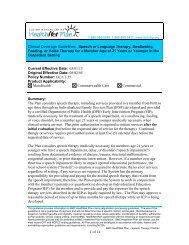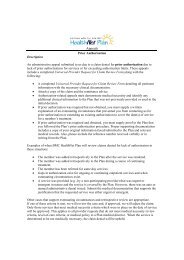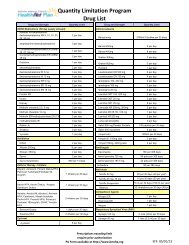IVIG - BMC HealthNet Plan
IVIG - BMC HealthNet Plan
IVIG - BMC HealthNet Plan
You also want an ePaper? Increase the reach of your titles
YUMPU automatically turns print PDFs into web optimized ePapers that Google loves.
pregnancies with <strong>IVIG</strong>, but the number of patients was not sufficient to rule out a<br />
chance finding. They concluded that <strong>IVIG</strong> as a treatment for RSPL is experimental<br />
and should only be used in a randomized clinical trial setting.<br />
41. Sickle cell disease. Evidence does not support <strong>IVIG</strong> use. 27,30 A Canadian expert panel<br />
of hematologists states that <strong>IVIG</strong> is not recommended for routine treatment of nonlife-threatening<br />
delayed hemolytic transfusion reactions in patients with sickle cell<br />
disease but could be used for serious, life-threatening reactions. 30<br />
42. Surgery or trauma, for prophylaxis of infections. Evidence does not support <strong>IVIG</strong><br />
use. 24<br />
43. Systemic sclerosis (systemic scleroderma). Evidence does not support <strong>IVIG</strong> use. In<br />
a small open label trial, <strong>IVIG</strong> reduced skin fibrosis in patients with systemic<br />
sclerosis. 150 Placebo-controlled trials are needed. In the natural course of the disease,<br />
skin atrophy may develop which would affect the measurement of skin involvement,<br />
and it is not known how <strong>IVIG</strong> would affect the other manifestations of systemic<br />
sclerosis (blood vessels, visceral organs). According to American College of<br />
Rheumatology guidelines for clinical trial design and outcomes in systemic<br />
sclerosis 151 ―randomized, double-blind, placebo-controlled trials are preferred. The<br />
treatment and follow-up period must be long enough to permit observation of any<br />
disease modification, which is likely to require 18-36 months, unless an<br />
extraordinarily effective therapy is identified. Responses selected should be<br />
quantitative, consistently and accurately reflect activity of systemic sclerosis in major<br />
target organs (not solely the skin), be sensitive to change, and be standardized, with<br />
limited variability.”<br />
44. Thrombotic thrombocytopenic purpura (TTP)/hemolytic uremic syndrome<br />
(HUS). Evidence does not support <strong>IVIG</strong> use. 27,30 A Canadian expert panel of<br />
hematologists states that <strong>IVIG</strong> may be one option among adjunctive therapies when<br />
first-line therapy has failed. 30<br />
45. Thrombocytopenia, heparin-induced. <strong>IVIG</strong> is contraindicated. <strong>IVIG</strong> could<br />
potentially increase the risk of thrombosis.<br />
46. Thromobocytopenia, nonimmune. Evidence does not support <strong>IVIG</strong> use. 24<br />
47. Transfusion reaction. Evidence does not support <strong>IVIG</strong> use. 30 According to the<br />
Canadian expert panel of hematologists there is no role for <strong>IVIG</strong> in routine<br />
management of hemolytic transfusion reaction but is an option in urgent situations. 30<br />
Patients are hospitalized.<br />
48. Transplantation, solid organ (e.g., heart, kidney) for prophylaxis or treatment of<br />
cytomegalovirus (CMV) infections. Antiviral therapy is currently used. 45,152-153<br />
Antiviral agents (ganciclovir, valganciclovir (Valcyte)) and CMV immune globulin<br />
(Cytogam ® ) are effective in preventing and treating CMV in solid organ transplant<br />
recipients.<br />
49. West syndrome (infantile spasms). There is insufficient evidence to recommend<br />
<strong>IVIG</strong>. 68<br />
This guideline provides information on <strong>BMC</strong> <strong>HealthNet</strong> <strong>Plan</strong> claims adjudication processing guidelines. The use of this<br />
guideline is not a guarantee of payment and will not determine how a specific claim(s) will be paid. Reimbursement is<br />
based on member benefits and eligibility, medical necessity review, where applicable, coordination of benefits, adherence<br />
to <strong>Plan</strong> policies, clinical coding criteria, and the <strong>BMC</strong> <strong>HealthNet</strong> <strong>Plan</strong> agreement with the rendering or dispensing provider.<br />
Reimbursement policies may be amended at <strong>BMC</strong> <strong>HealthNet</strong> <strong>Plan</strong>’s discretion. <strong>BMC</strong> <strong>HealthNet</strong> <strong>Plan</strong> will always use the<br />
most recent CPT and HCPCS coding guidelines.<br />
<strong>BMC</strong> <strong>HealthNet</strong> <strong>Plan</strong> – <strong>IVIG</strong><br />
32 of 45



